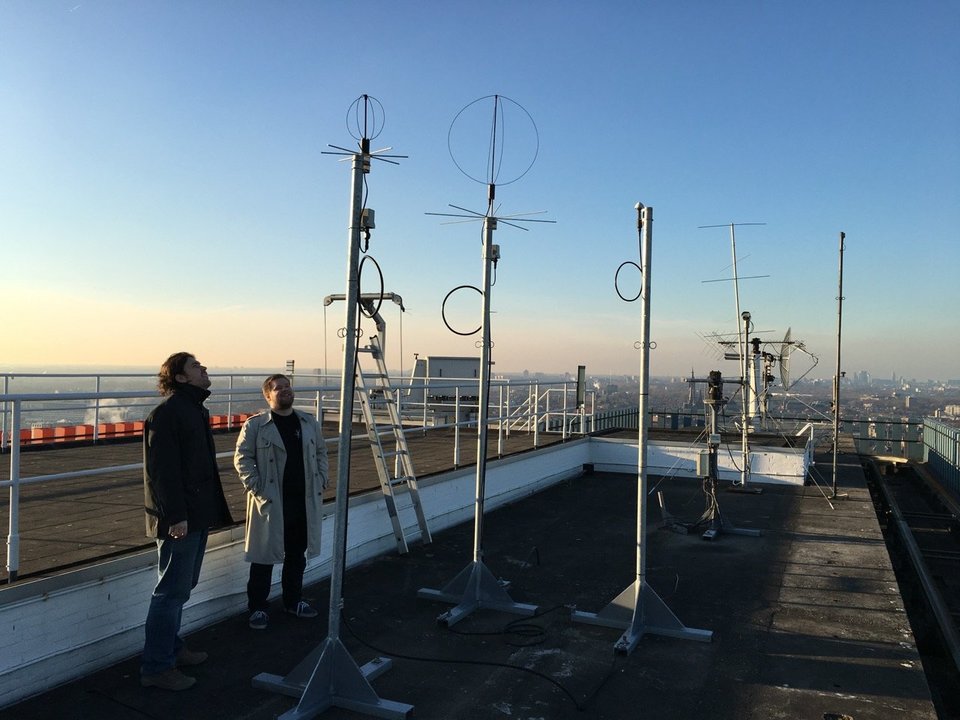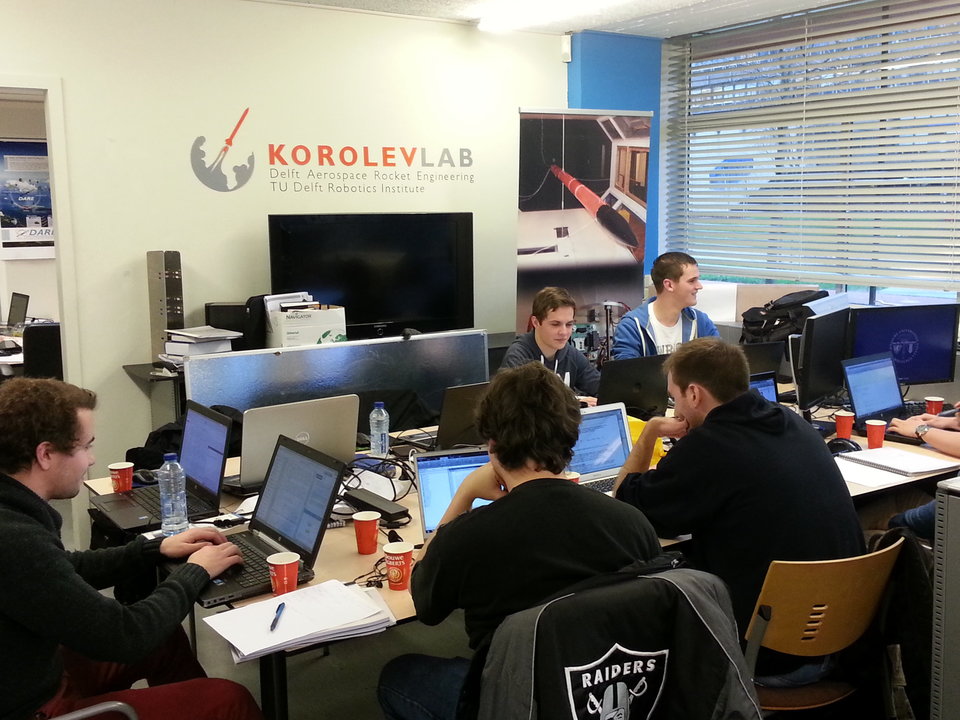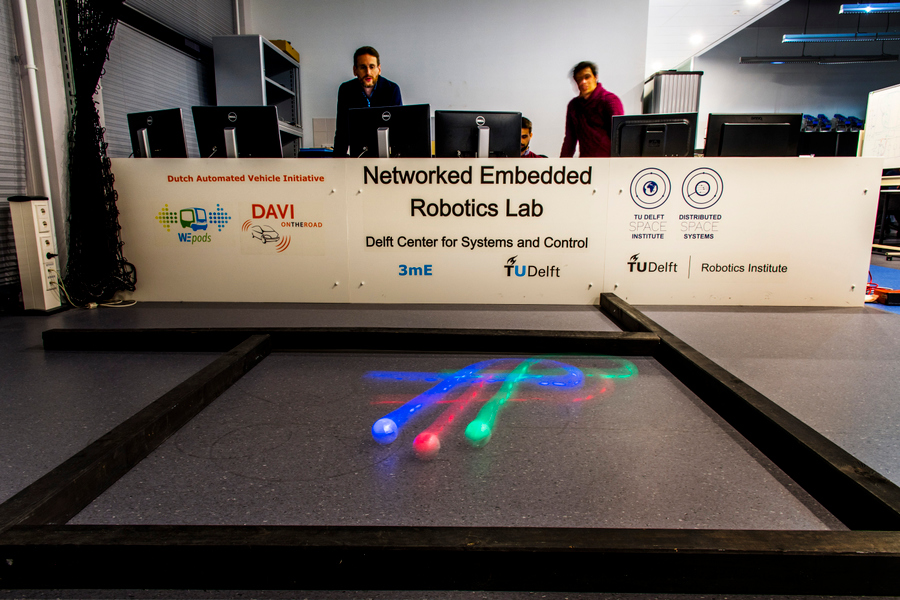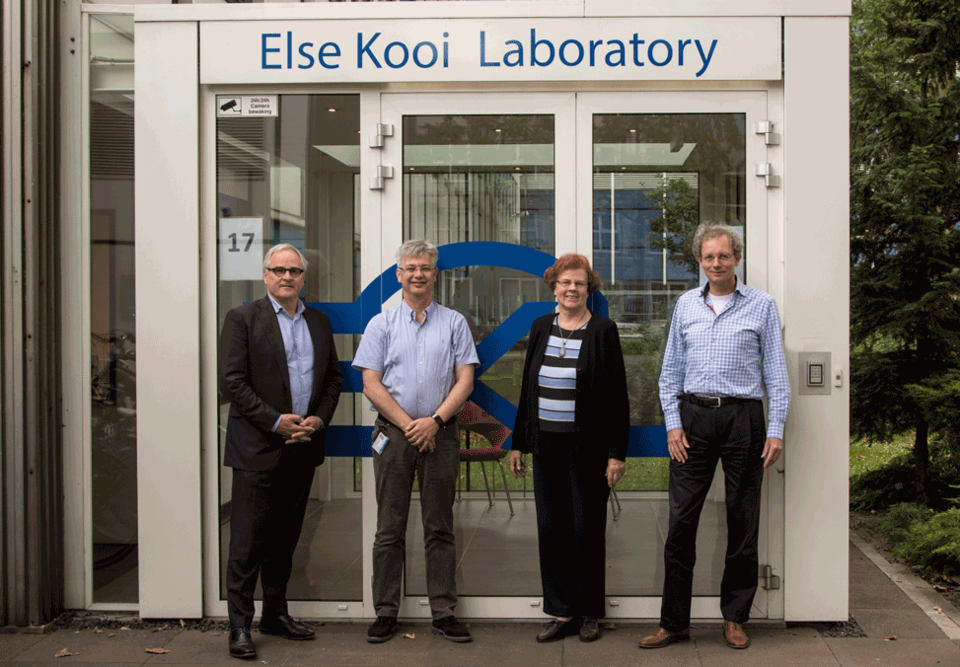Expertise areas at the TU Delft Space Institute
Many research groups at Delft University of Technology are currently working on topics directly related to or linked to Space. In specific areas, such as precise orbit determination, Geoscience, Space Instrumentation, and the Delfi -program, research groups have achieved a renowned recognition and belong to the top groups worldwide.
Five faculties are key contributors to the Space sector at the university. The TU Delft Space Institute will contribute substantially to the development of knowledge exchange, cooperation and visibility within and outside of the university.
More on the specific expertise areas and contact details for the various experts can be found in our online directory.
Facilities

Ground station
A satellite ground station is present on the roof of the EWI building for VHF, UHF and the S-band communication as well as for the reception of pulsar signals for an FP7 project. Within the TU Delft Space Institute, the ground station will be further extended and innovated to be able to handle multiple satellites and large data streams. The existing cooperation with ISIS will be intensified.
Clean room for satellite integration
An ISO 8, class 100,000 cleanroom exists on the 8th floor of the Aerospace Faculty. The cleanroom has been established in 2005 and is officially registered as an Aerospace Engineering facility since 2012. Its mission is to facilitate high-level research on space systems while, at the same time, providing students with education and training in the field in a professional environment. On this facility space systems are developed, integrated and tested. A cleanroom manager coordinates the work of students, assures safety, facilitates research activities and offers training in proper usage of facility equipment.
Korolev Lab
Korolev Lab, named after Sergei Korolev, father of practical astronautics, is a one of its kind lab in the entire campus of TU Delft. It houses the Armature Rocketry European Altitude holder and one of the Dream Teams – Delft Aerospace Rocket Engineering (DARE). Although the lab is a facility of TU Delft Robotics Institute, DARE is its primary user where the lab is now DARE’s primary mission planning floor for Stratos II and eight other teams within DARE working all year round in the fields of propulsion, structures, recovery systems, electronics and experimental rocket concepts. It provides one of the best environments to foster future rocket engineers
Network Embedded Robotics Lab
The DCSC NERDlab focuses on developing novel distributed algorithms in the field of robotics by providing a variety of low cost platforms and sensor nodes. Using a modular software framework the lab setup aims at providing students an easy to use setup that allows them to experimentally validate these algorithms. Arguably the most important problem in robotics is the localization problem. The Networked Embedded Robotics lab provides two separate hardware setups to handle this problem. First it employs an infrared camera system by Optitrack. The Optitrack system can publish the location and orientation of objects with a millimeter accuracy at a rate of 120 Hz. The second localization system is called the Cricket, by MIT. Crickets use a combination of RF and ultrasonic signals to determine the distance between each other by measuring the time difference of arrival of the two signals.
Cyber Zoo
The Cyber Zoo is a research and test laboratory for flying and walking swarm robots. The flying dragonfly robot DelFly and the six-legged walking robot Zebro are working together there, carrying out tasks in all kinds of different environments without the help of people. Swarm robots work in a way that is comparable to that of a colony of ants. In themselves, the robots are relatively simple, but in a group, they are capable of performing complex tasks, such as carrying out measurements and making observations. The Cyber Zoo, the TU lab in the aircraft hangar at the Faculty of Aerospace Engineering, is a ten by ten-metre space in which swarm robots have all the room they need to interact. Meanwhile, twelve high-tech cameras are used to analyse how the crawling and flying robots move and work together. This means the 3D coordinates and postures of the robots can be analysed accurately, after experiments.
Else Kooi Laboratory
The Else Kooi Laboratory and its staff aim to provide micro fabrication capabilities that facilitate excellence in (sub)micro-fabrication oriented Research& Science, enable customers to test out concepts that may lead to business successes (up to and including small scale production) and build a bridge between Academics and Industrial Innovation. In terms of facilities, processes and expertise, the lab is superbly equipped for micro-manufacturing at the cutting edge of integrated circuits, micro-electromechanical systems and working with flexible substrates. The combination of these technologies is what makes the lab unique.PhD dissertations
Below is a list of abbreviations used for faculties involved in the TU Delft Space Institute:
| ME: | Mechanical Engineering |
| AE: | Aerospace Engineering |
| CEG: | Civil Engineering and Geosciences |
| EEMCS: | Electrical Engineering, Mathematics and Computer Science |
| AS: | Applied Sciences |
2019
Xinyuan Mao, Absolute and Relative Orbit Determination for Satellite Constellations, AE
Tim Visser, Cross-wind from linear and angular satellite dynamics – The GOCE perspective on horizontal and vertical wind in the thermosphere, AE
Zheng Xu, Estimate Regional mass balance of Greenland Ice sheet using both GRACE data and Input-Output Method, AE
Zixuan Zheng, Autonomous Onboard Mission Planning for Multiple Satellite Systems, AE
Tatiana Bocanegra Bahamon, Planetary Radio Interferometry and Doppler Experiment (PRIDE) for radio occultation studies: A Venus Express test case, AE
Svenja Woicke, Hazard Relative Navigation: Towards safe autonomous planetary landings in unknown hazardous terrain, AE
2018
Marsil De Athayde Costa E Silva, MEMS Micropropulsion: Design, Modeling and Control of Vaporizing Liquid Microthrusters, AE
Haiyang Hu, Rotational dynamics of viscoelastic planetary bodies, AE
Minghe Shan, Porous organic framework (POF) membranes for CO2 separation, AS
Dadui Cordeiro Guerrieri, The low-pressure micro-resistojet: Modelling and optimization for future nano- and pico-satellites, AE
2017
Yu Sun, Estimating geocenter motion and changes in the Earth’s dynamic oblateness from GRACE and geophysical models, CEG
Bart Root, Gravity Field Constraints on the Upper Mantle of Northwestern Europe, AE
Ferdi de Bruijn, Guidance control and dynamics of a new generation of geostationary satellites, AE
Sha Lu, Variational Data Assimilation of Satellite Observations to Estimate Volcanic Ash Emissions, EEMCS
Reinier Janssen, Multiwavelength Observations of Active Galactic Nuclei, AS
2016
Hermes Jara Orue, Rotational Dynamics of Icy Satellites, AE
Steven Engelen, Swarm Satellites: Design, Characteristics and Applications, AE
Raj Thilak Rajan, Relative Space-Time Kinematics of an Anchorless Network, EEMCS
Rouzbeh Amini, Wireless Communication onboard Spacecraft, AE
Jinglang Feng, Orbital dynamics in the vicinity of contact binary asteroid systems, AE
Andreas Ohndorf, Multiphase Low-Thrust Trajectory Optimization Using Evolutionary Neurocontrol, AE
2015
Jing Chu, Dynamics, Distributed Control and Autonomous Cluster Operations of Fractionated Spacecraft, AE
João Rebelo, Robust and Transparent Multi-Degree-of-Freedom Bilateral Teleoperation with Time-Delay, AE
Dominic Dirkx, Interplanetary laser ranging; analysis for implementation in planetary science missions, AE
Joao de Teixeira da Encarnacao, Next generation satellite gravimetry for measuring mass transport in the Earth system, AE
